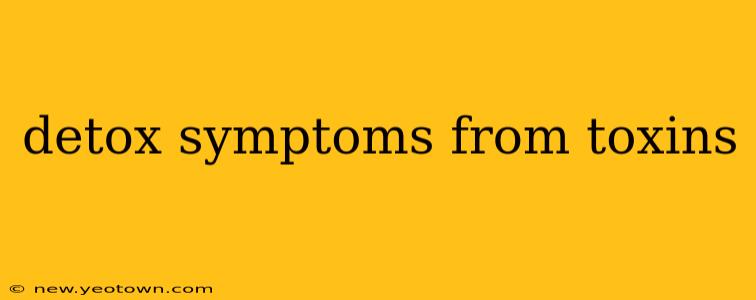Imagine your body as a meticulously crafted machine. It works tirelessly, day in and day out, processing everything you ingest, inhale, and absorb from the environment. Over time, however, this amazing machine can accumulate toxins, leading to a range of uncomfortable symptoms. Understanding these symptoms is crucial, not just for recognizing when your body might need support, but also for understanding the natural processes involved in detoxification. This isn't about a quick fix; it's about working with your body's inherent cleansing mechanisms.
This isn't a medical guide, and before making any significant dietary or lifestyle changes, especially if you have pre-existing health conditions, consult your doctor or a qualified healthcare professional. They can assess your individual needs and help you create a safe and effective plan.
What are the Common Detox Symptoms?
Detox symptoms can vary greatly depending on the individual, the type and amount of toxins involved, and the method used (if any) to support the body's natural detoxification processes. However, some common signs your body might be undergoing a detoxification process include:
- Headaches: As your body works to eliminate toxins, it can sometimes lead to headaches, especially in the initial stages.
- Fatigue: Detoxification is hard work! Your body is diverting energy to cleanse itself, resulting in tiredness.
- Muscle aches and pains: This can be a result of the body releasing toxins that are stored within muscle tissue.
- Nausea and digestive upset: As your digestive system flushes out toxins, you might experience nausea, bloating, diarrhea, or constipation.
- Skin issues: Breakouts, rashes, or increased itching can be a sign that your body is trying to eliminate toxins through your skin.
- Flu-like symptoms: Some people report feeling feverish, achy, and experiencing other flu-like symptoms during a detox.
How Long Do Detox Symptoms Last?
How long do detox symptoms last?
The duration of detox symptoms varies considerably. It depends on factors like the individual's overall health, the type and severity of toxin buildup, and the support provided to the body. For some, symptoms might be mild and last only a few days. For others, they could be more intense and last for several weeks.
Remember, feeling unwell during a detox doesn't necessarily mean it's failing. It can indicate the process is actively working to remove toxins. However, if symptoms are severe or persistent, it’s crucial to seek medical advice.
Are Detox Symptoms a Sign of a Serious Illness?
Are detox symptoms a sign of a serious illness, or just a normal process?
While detox symptoms can be part of the body's natural cleansing process, they can also be indicators of underlying health issues. If you're experiencing severe or persistent symptoms, it’s vital to rule out any serious medical conditions. Your doctor can conduct tests and provide a proper diagnosis. Don't self-diagnose; professional guidance is essential.
Can Detoxification Cause Severe Symptoms?
Can detoxification cause severe symptoms, and when should I seek immediate medical attention?
Yes, detoxification can occasionally cause severe symptoms. While mild discomfort is sometimes expected, severe symptoms like intense pain, high fever, difficulty breathing, or significant changes in mental state warrant immediate medical attention. These could indicate a more serious problem requiring prompt medical intervention.
Supporting Your Body's Natural Detoxification
Your body possesses a remarkable innate ability to detoxify. You can support this natural process through several methods:
- Hydration: Drink plenty of clean water to help flush out toxins.
- Nutritious diet: Focus on whole, unprocessed foods rich in vitamins, minerals, and antioxidants.
- Regular exercise: Physical activity helps improve circulation and elimination.
- Sufficient sleep: Rest is vital for the body’s restorative processes.
- Stress management: Chronic stress can hinder detoxification. Incorporate stress-reducing techniques like meditation or yoga.
Remember, detoxification is a gradual process. It's not a race; it's about nurturing your body’s natural abilities to cleanse and heal itself. By understanding the common symptoms, seeking professional advice when needed, and supporting your body through healthy lifestyle choices, you can embark on a journey toward a healthier, more vibrant you.

